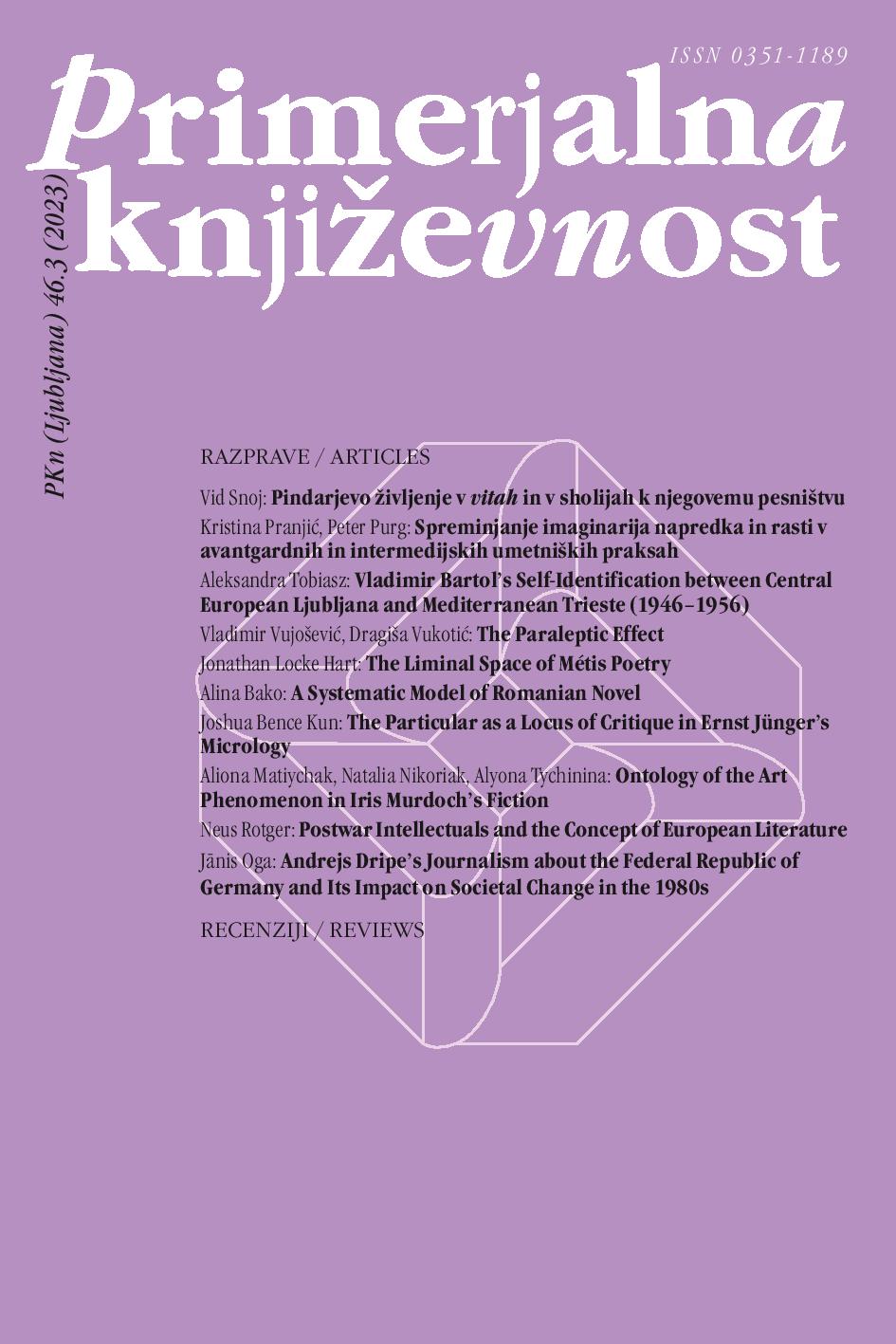The Paraleptic Effect
DOI:
https://doi.org/10.3986/pkn.v46.i3.04Keywords:
narratology, paralepsis, narrative epistemology, Moby-Dick, À la recherche du temps perdu, The Great GatsbyAbstract
This article examines the alleged narratological paradox of paralepsis. It is argued that the first-person narrators of Moby-Dick, À la recherche du temps perdu and The Great Gatsby (to name but three prominent examples) occasionally display an inexplicable awareness of facts that would be naturally inaccessible to them (knowledge of other people’s thoughts, minute familiarity with unwitnessed events, etc.). Paralepsis, as Genette calls it, can be defined as the class of situations in which a first-person narrator seems to exercise the impossible epistemic privilege. This paper argues against the existence of genuine paraleptic events on two levels. First, it is argued that this kind of narration is rarely epistemically paradoxical. Even some of the strongest candidates for paralepsis could be naturalized (the reader can detect possible natural ways in which the narrator might have obtained the seemingly impossible information). Second, even in cases where they cannot be convincingly naturalized, “paralepses” need not be mysterious. It is often possible to read them (as P. Dawson has done) as “authorial performances.” They can be explained as instances of a specific rhetorical procedure that we have termed raconteural narration: a mode of narration in which, for the sake of more convincing exposition, mere conjectures are offered without the usual modal phrases that indicate the speculative quality of such assertions and thus create the erroneous impression of uncanny narrative knowledge.
References
Alber, Jan, Henrik Skov Nielsen, and Brian Richardson. “Unnatural Voices, Minds, and Narration.” The Routledge Companion to Experimental Literature. Eds. Joe Bray, Alison Gibbons and Brian McHale. London; New York, NY: Routledge, 2012. 352–368.
Bell, Alice, and Marie-Laure Ryan. “Introduction: Possible Worlds Theory Revisited.” Possible Worlds Theory and Contemporary Narratology. Eds. Alice Bell and Marie-Laure Ryan. Lincoln, NE: University of Nebraska Press. 2019. 1–43.
Dawson, Paul. The Return of the Omniscient Narrator: Authorship and Authority in Twenty-First Century Fiction. Columbus, OH: Ohio State University, 2013.
Edmiston, William F. “Focalization and the First-Person Narrator: A Revision of the Theory.” Poetics Today 10.4 (1989): 729–744.
Fitzgerald, Francis Scott. The Great Gatsby. Ware: Wordsworth Classics, 2001.
Ford, Ford Madox. The Good Soldier. Eds. Kenneth Womack and William Baker. Peterborough: Broadview Literary Texts, 2003.
Genette, Gérard. Narrative Discourse: An Essay in Method. Transl. Jane E. Lewin. Ithaca, NY: Cornell University Press, 1983.
Hamburger, Käte. The Logic of Literature. Transl. Marilynn J. Rose. Bloomington, IN: Indiana University Press, 1973.
Heinze, Ruediger. “Violations of Mimetic Epistemology in First-Person Narrative Fiction.” Narrative 16.3 (2008): 279–297.
Melville, Herman. Moby-Dick. San Diego, CA: Word Cloud Classics, 2014.
Nünlist, René, and Irene de Jong. “Homeric Poetics in Keywords (P).” Prolegomena. Eds. Joachim Latacz, Anton Bierl and Stuart Douglas Olson. Berlin; Munich; Boston, MA: De Gruyter, 2015. 164–176.
Pennacchio, Filippo. “Enhanced ‘I’s: Omniscience and Third-Person Features in Contemporary First-Person Narrative Fiction.” Narrative 28.1 (2020): 21–42.
Petterson, Bo. “Beyond Anti-Mimetic Models: A Critique of Unnatural Narratology.” Rethinking Mimesis: Concepts and Practices of Literary Representation. Eds. Saija Isomaa, Sari Kivistö, Pirjo Lyytikäinen, Sanna Nyquist, Merja Polvinen, and Riika Rossi. Newcastle upon Tyne: Cambridge Scholars Publishing, 2012. 73–92.
Phelan, James. Narratve as Rhetoric: Technique, Audiences, Ethics, Ideology. Columbus, OH: Ohio State University, 1996.
Proust, Marcel. In Search of Lost Time. Transl. C. K. Scott Moncrieff. N.a.: Centaur Editions, 2016.
Ricoeur, Paul. “Narrative Identity.” Philosophy Today 35.1 (1991): 73–81.
Skov Nielsen, Henrik. “The Impersonal Voice in First-Person Narrative Fiction.” Narrative 12.2 (2004): 133–150.
Von Contzen, Eva. “Unnatural Narratology and Premodern Narratives: Historicizing a Form.” Journal of Literary Semantics 46.1 (2017): 1–23.


